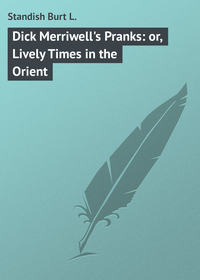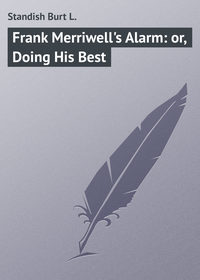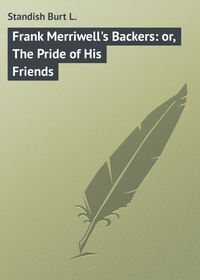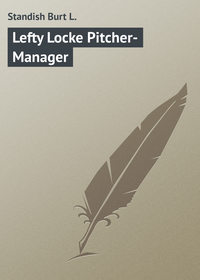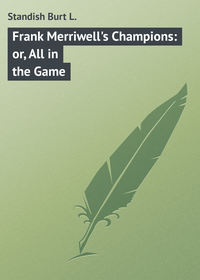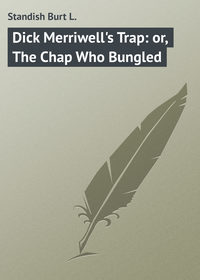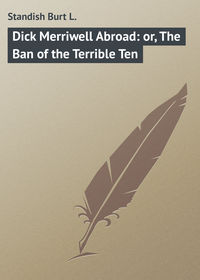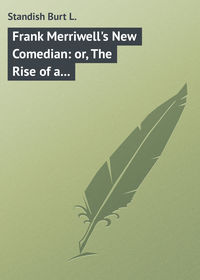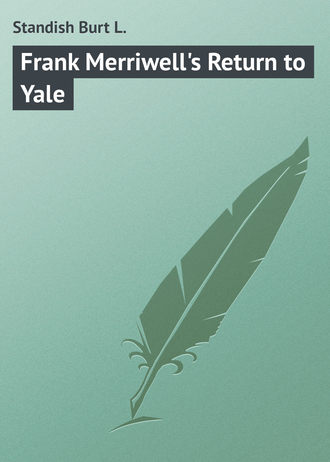 полная версия
полная версияFrank Merriwell's Return to Yale
"If I could cut Merriwell out with her!" he thought. "Ah! that would be a rich revenge! But Paula might object! Never mind; I've given Paula no particular reason to think I am stuck on her. If she is stuck on me, it's not my fault. There is no reason why I should not try to catch on with Miss Burrage."
He compared Inza and Paula, and he saw that the former was far the handsomer girl. She had a strikingly attractive face with large dark eyes, red lips and perfect teeth, while the color that came and went in her cheeks told the tale of perfect health. He could see that she was destined to become the kind of a young lady who always creates a sensation when she enters a drawing-room and causes men to turn and look after her on the street.
The more Marline thought it over, the firmer became his determination to do his best to win Inza from Frank Merriwell. He laughed to himself when he thought what a revenge that would be upon the fellow he hated.
"What are you laughing at?" cried Benjamin, somewhat offended. "I tell you Harvard would have won in a walk if it hadn't been for that fellow Merriwell."
"Beg pardon," said Marline, quickly. "Did I laugh? Excuse me. Still, I think you overestimate Merriwell."
"Not a bit of it. He's the best man on the Yale eleven. Besides that, he is one of the best baseball pitchers who ever twirled a ball. He has done more for Yale sports and athletics than any one man ever did before in the same length of time."
"He had the opportunities to-day," said Marline. "That's how he happened to do so much."
"He made the opportunities," declared Benjamin. "What kind of an opportunity was it when three of our men piled upon him and he carried them more than fifteen yards? That was something wonderful!"
"Don't speak so loud, Jack," cautioned Paula. "He is in the parlor, and he might hear you."
"Well, I'm sure I'm not saying anything that could offend him."
"It might give him the swelled head," put in Marline.
Inza turned on him like a flash.
"It is evident you do not know him very well, Mr. Marline," she said, severely. "Frank Merriwell never gets the swelled head."
Marline was somewhat embarrassed, but, with the utmost suavity, he bowed to her, smoothly saying:
"It is possible I do not know him very well, as you say; but I am sure almost any fellow might be in danger of getting a touch of swelled head had he done the things Mr. Merriwell did to-day."
He said this so gracefully that Inza's threatened anger was averted, and she fell to chatting with him, much to his satisfaction.
They were standing close together, talking earnestly, Marline supporting himself by leaning on the back of a chair, when Frank left the parlor, saying to Miss Gale that he must hasten to catch a train back to New Haven.
The library door opened into the hall, and Frank saw Inza chatting with Rob Marline in a manner that seemed very friendly and familiar. The sight gave him a start, and the hot blood rushed to his cheeks.
Inza knew Frank had seen them, but she did not turn to look at him. She began to laugh in her most bewitching manner, as if amused very much at something Marline had said, and leaned a little nearer her companion.
Frank seemed dazed. The sight of Rob Marline in that house chatting thus with Inza seemed a revelation to him. All at once, he fancied he understood the situation – fancied he knew why Inza had not wished him to play on the Yale football team.
"We shall be in New Haven the last of the week, Mr. Merriwell," said Miss Abigail. "She'll get over it by that time, and we'll call. It's nothing but a foolish whim."
She spoke the words just loud enough for Frank to hear, but he did not seem to understand. Like one in a dream, he took his cap from the rack and turned toward the door.
"Good-day, Mr. Merriwell," called the old maid.
"Eh? Oh! Good-day!"
Frank paused at the door and looked back; then he spoke, loudly enough to be heard in the library:
"I shall be pleased to see you at any time, Miss Gale, but, if you call on me, perhaps it would be well not to bring a certain person with you. It might be embarrassing and unpleasant. Good-day."
Bounding down the steps, Frank walked swiftly away. There was a hard, set look on his face, which had grown singularly pale.
"Yes," he muttered, "I understand it all now. She would not tell me why she did not wish me to play on the eleven, but I know now. Somewhere she has met Rob Marline, and she is stuck on him. He wanted to play full-back for Yale, and she aided him all she could by inducing me to promise that I would not play. I see through the whole game! She was playing me for a fool! I did not think that of her, but it is as clear as crystal."
And Marline had cut him out with Inza! He felt sure of that.
"Well," he grated, "I have been easy with that fellow. Now we are enemies to the bitter end! Let him look out for me!"
CHAPTER XXXIX
THE HOMEWARD JOURNEY
"What's the matter with Merriwell?" asked Lewis Little, speaking to a group of jolly lads who were on the train that bore the Yale football team out of Boston on its way to New Haven. "He's grouchy."
"Is he?" cried Paul Pierson. "Well, he ought to be ashamed of himself! Why, he's the hero of the day! All the papers will have his picture to-morrow. I saw at least five persons snapping him with cameras on the field. Grouchy, is he? Well, confound him! He has no right to get a grouch on."
"Not a bit of it!" cried Charlie Creighton. "What's the matter with him? Where is he?"
"He's sitting back in the end of the car, looking fierce enough to eat anybody."
Creighton, Pierson and several others sprang to their feet and looked for Frank. They saw him.
He was staring out of the window in a blank manner, although he did not seem to notice anything the train passed. He was paying no attention to the gang of shouting, singing, laughing students, who filled the smoker and were perched on the backs of the seats and crowded into the aisles.
"Hey, Merry!" shouted Creighton. "Shake it, old man – shake it! Come up here! Get into the game!"
Frank looked around, shook his head, and then looked out of the window again.
"Well, hang him!" growled Charlie. "Any one would think he had played with Harvard, instead of winning the game for Yale! What can be the matter with him?"
No one seemed to know. Creighton went down and talked to Frank, but could get no satisfaction out of him.
As soon as he was let alone again, Merriwell fell to gazing out of the window, seeming quite unaware of the shouts and songs of the jolly lads in the car.
When strangers crowded into the car to get a look at the man who had won the game for Yale, having heard he was on the train, he still continued to gaze out of the window, and it was not apparent that he heard any of their remarks.
"Tell you what," said Creighton, as he returned to Pierson and the others of the little group, "Merriwell is sore."
"Sore?" cried Tom Thornton, "he can't be any sorer than I am! Why, I was jumped on, kicked, rammed into the earth, and annihilated more than twenty times during that game. A little more of it would have made a regular jellyfish out of me. I'll be sore for a month, but I believe in being jolly at the same time."
Then he broke forth into a song of victory, in which every one in that car seemed to join, judging by the manner in which the chorus was roared forth.
"Boom-to-de-ay, boom-ta-de-ay,Boom-to, de-boom-ta, de-boom-ta-de-ay;We won to-day, we won to-day,We won, oh, we won, oh, we won to-day."Any one who has not heard a great crowd of college lads singing this chorus cannot conceive the volume of sound it seems to produce. When they all "bear down together" on the "boom-ta," the explosive sound is like a staggering blow from the shoulder.
But even this song of victory did not seem to arouse Frank in the least. He remained silent and grim, being so much unlike his usual self that all who knew him were filled with astonishment.
"I did not mean that he was sore of body," said Creighton. "I think he is chewing an old rag."
"What do you mean by that?"
"Well, you know, we all gave him the marble heart when we thought he had decided not to play football because he was afraid for certain reasons. I think he is sore over that, and I don't know that I blame him. I swear, fellows, we did use him shabby!"
"That's it," nodded Pierson; "that's just it. And he is proud and sensitive. He would not show he cared a continental before the game, but, now he was the means of saving the day for Yale, I fancy he is chewing over it a little."
"Never thought of that," said Bink Stubbs. "Bet you're right, fellows. We'll have to get down on our hulks to him to make it all right. I'm ready to say I'm ashamed of myself, and ask him to forget it."
The others expressed themselves as equally willing, and so it came about that Frank was much surprised to have them come to him, one after another, and confess they had used him shabbily. He was ready enough to shake hands with them all, while he assured them he did not hold the least hardness.
They saw he was in earnest, they were satisfied he was willing and ready to forget they had ever treated him with contempt, and yet he did not cheer up, which was something they could not understand.
"Better let him alone," advised Creighton, after a little. "It may be something we don't know anything about, that he is chewing. Anyway, he's not himself."
Bruce Browning, big and lazy ever, was one of the group. He had been keeping still, but now he observed:
"That's right, let him alone. I've traveled with him, and I never saw him this way before. I tell you he is dangerous, and somebody may get hurt."
"Keep away from the window, my love and my dove —Keep away from the window, don't you hear!Come round some other night,For there's gwine to be a fight,And there'll be razzers a-flyn' through the air."Thus sang Bink Stubbs.
"Look at Harris!" laughed Thornton, nudging the fellow nearest him. "Don't he look sour? They say he got hit to-day."
"Got hit?"
"Yes."
"What with?"
"A roll."
"A roll of what?"
"Bank notes."
"You mean he has been betting?"
"Sure."
"But you don't mean he bet on Harvard?"
"I understand he put his last cent on Harvard, and went broke. He was fortunate enough to have a return ticket to New Haven, so he didn't have to borrow money to get back on."
Harris was sitting in a seat, looking sulky and disgusted, fiercely trying to chew the end of his short black mustache. His hat was pulled over his eyes, and he did not seem to take much interest in what was going on in the car.
Stubbs and Creighton got a crowd together to jolly Harris, and they descended on him in a body.
"Hello, old man!" cried Charlie, gayly. "Is it straight that you won three hundred on Yale to-day?"
"I heard it was five hundred," chirped Bink Stubbs, "What a pull to make! Congratulations, old man!"
"You'll have to ball the crowd when we get to New Haven, Sport," said Lewis Little. "You can afford to open fizz."
Harris smiled in a sickly way, and tried to say something, but Paul Pierson got him by the hand and gave him a shaking up that literally took away his breath.
"Good boy!" cried Paul. "I'm glad you stuck by old Eli! But did you have the nerve to bet every cent you had that Yale would take that game? My, my! You are a nervy fellow, Sport, old chap. You were the only man who had all that confidence."
"Sport never goes back on old Yale," laughed Little. "He knew the chance of Yale's winning looked slim, but still he backed her up. That's what makes him look so cheerful now."
"You would have felt bad if you had bet your money on Harvard, now wouldn't you?" cried Thornton.
"Oh, yes, I certainly should," gasped Harris, who was suffering tortures.
"What a jolly time we'll have drinking fizz on you, old man!" exclaimed Bink Stubbs. "I feel as if I might get away with about four quarts."
"Oh, we'll make a hole in your winnings!" laughed Pierson. "I am so dry this minute that my neck squeaks."
"So are we all!" shouted the others.
Harris could not repress a groan. He wondered if they were fooling with him, but they seemed so much in earnest that he could not tell. Perhaps they really thought he had won a big roll on Yale. He couldn't tell them he had bet on Harvard. What could he do?
He was forced to pretend that he was delighted, but over and over he promised himself that he would give them the slip, even if he had to leap from the train while it was running at full speed. Pay for fizz! Why, he didn't have enough left to pay for a glass of plain beer!
CHAPTER XL
REJOICING AT YALE
Harris found his opportunity to slip away when the train drew into the station at New Haven.
A band of music was on hand to meet the returning conquerors. A wild mob of screaming, cheering, horn-tooting students was there.
It was evening, and the Yale lads had come down to the station with torches, prepared to give the eleven such a reception as no other football team had ever met.
When the train drew into the station, the band was hammering away at a blood-stirring tune. When the train stopped, the great crowd of young men and boys presented a perfect sea of upturned faces beneath the flaring light of the torches. Blue was everywhere. It was Yale's great day, and all New Haven wore the color.
The train stopped. Then there was a fierce swaying and surging of the crowd, a flutter of flags, followed by a mighty cheer that was like a savage yell of joy over the downfall of a defeated and slain enemy.
How they shouted for Yale! How they swayed and surged! How like lunatics they were!
The sound of the band was drowned, and not a strain of music could be heard. The musicians continued to play, but they might have saved their breath.
The crowd knew well enough that the eleven would be on the smoker. That was the car in which the victors could disport themselves as hilariously as they pleased.
The smoker began to discharge its passengers. Paul Pierson was the first to get off, and he was followed closely by a stream of Yale men.
The general cheering had died down, but almost every man who stepped from the train was greeted in some peculiar manner.
"What's the matter with Yale?" howled a voice.
Then a thousand throats seemed to roar back:
"She's all right! 'Rah! 'rah! 'rah! 'Rah! 'rah! 'rah! Yale!"
Bruce Browning appeared.
"Hey, Brownie!" cried some one on the platform. "How's your corns?"
"Sore," answered the big fellow. "Strained 'em cheering for Yale."
Bink Stubbs came forth riding astride Puss Parker's shoulders. Somewhere on the train he had captured a silk hat that was much too large for him, and it had dropped down over his head to his ears, which were lopped forward by the weight of it. In the hatband was stuck the short staff of a small flag. Bink had a horn, and he blew a hoarse blast the moment he was outside the car.
"Where'd you get that horn?" called a voice.
"This horn's nothing," returned the little fellow. "I've had about twenty horns besides this, and still my neck is dry."
Four fellows came off the car, carrying a fifth. They held their caps in their hands, and were as mournful and sad-appearing as possible. The one who was carried had a big white placard on his breast. On the card were these words:
"I bet a dime on Harvard, and dropped dead after the game!"
It was not an easy thing to carry him down the steps, but the mournful-appearing bearers succeeded in doing the trick.
Dismal Jones came forth from the car. He was holding a handkerchief to his eyes and pretending to weep.
This brought a shout of delight, and some one yelled back:
"Weep for poor old Harvard. She needs it."
Then Capt. Forrest of the eleven appeared.
A mighty roar went up the moment he was seen. It was a great shout of admiration and welcome. It brought a hot flush of satisfaction to his cheeks, and he stood bowing and smiling on the platform.
"What's the matter with Forrest?" shrieked a voice, when the noise lulled somewhat.
"He's a lulu!" shrieked another voice.
"He's all right – he is!" roared the crowd.
Then they cheered for him in the regular manner.
Each player was received with an ovation as he came out of the car, and they must have felt themselves well repaid for their weeks of hard training and practice.
Frank Merriwell was nearly the last one to show himself. The crowd had been waiting for him.
What a shout went up! The torches flared, and it seemed that the very stars quivered with the volume of sound.
"Merriwell! Merriwell! Merriwell!" roared the vast throng.
Roar! roar! roar! It seemed that they would never stop. It was an ovation that might have pleased a monarch.
Frank would have been less than human had he not thrilled with satisfaction as he heard them cheering him thus. He took off his cap and bowed again and again. He tried to descend from the steps and mingle with the throng, but some of them held him back. They seemed to want him up there where they could look at him.
It was some time before the cheering subsided. At last, somebody began to shout:
"Speech! speech! speech!"
Frank shook his head, but it was useless. They were determined he should say something. He saw he could not escape, so he held up one hand.
Silence fell on the great crowd beneath the torchlights.
Then Frank spoke – a single sentence:
"Every man of us did his level best for dear old Yale!"
That was enough. They went mad again, and again they roared till they were hoarse. They cheered for Yale, they cheered for Forrest, they cheered for Merriwell. Of everything for which they cheered, Merriwell created the greatest enthusiasm.
Then he was lifted from the steps and carried away on the shoulders of his admirers, while the mob swarmed after him.
The band got out and formed to head the parade of triumph. The crowd of students fell in behind. The band struck up, and away they went, with the Yale eleven close behind them.
Great crowds had turned out to witness the spectacle, knowing the students meant to give their victorious team a rousing reception. All along the line the spectators cheered and waved hats, flags and handkerchiefs.
A committee had raised a fund for fireworks, and Roman candles began to pop up balls of fire, while rockets went whizzing into the air from the head of the procession.
No one interfered with the rejoicing students. It was their night, and the city fathers remained in the background and permitted them to have a glorious time.
Some of the business places were prepared for their appearance with illuminated windows. All New Haven seemed delighted.
This year every one had seemed to expect Harvard would "wipe up the gridiron" with Yale, and this victory was so unexpected that it set the people wild with delight.
All along the line the students sang and cheered. Now and then the band could be heard pounding away industriously.
In this manner they marched to the college grounds. As they drew near the college, Browning suddenly descended on the trombone player and captured his horn.
That was a signal for a general rush upon the band by the boys, and, within three minutes, every instrument was in the hands of a Yale student.
Some of the boys could play on the instruments they captured, and some could simply make a noise.
"Attention!" roared Browning, who seemed to have awakened from the lethargy that had been on him so long, and was once more a leader in a genuine racket. "We will play the 'Star-Spangled Banner.' All ready! Let her rip!"
They played! Such a wild medley of sounds never was heard before. Puss Parker had a cornet, and he was playing the air of the "Star Spangled Banner," while Browning was putting in the variations with the trombone. But the others played anything they could think of and some things they could not think of! "John Brown's Body," "Yankee Doodle," "Marching Through Georgia," "Suwanee River," and "Hail Columbia," were some of the tunes that mingled in that medley. Those who could not play anything at all added to the hideous din by making the captured horns bleat forth horrible sounds. Bink Stubbs had secured the bass drumstick, and the way he hammered the big drum was a caution. He did his best to break in the head – and finally succeeded!
In this manner the rejoicing students marched right in upon the campus, regardless of policemen, professors, rules or regulations.
CHAPTER XLI
A CONTRAST IN ENEMIES
It was a wild night on the Yale campus. Even the worst old "grind" in the college came out and looked on while the hilarious students made merry, even if he did not join in the riotous proceedings.
A bonfire was built. Once there had been rules prohibiting such fires, but of what use were rules now! Boxes, barrels, lumber, fencing, almost anything that would make a blaze was brought in and heaped up there. It was done in a rush in a manner that showed all preparations had been made in advance, although the combustible material had not been piled up till the time arrived when the fire was required.
Around the great fire the students with the instruments belonging to the band marched and tooted and sang. Bink Stubbs had knocked in one end of the bass drum, but he continued to hammer away on the other end, apparently doing his best to break that in also. Bruce Browning "tore off" music and other sounds with the trombone, while Puss Parker astounded those who knew him best by his skill with the cornet, for he really could play at some tunes.
About twenty fellows tied handkerchiefs over their faces, turned their coats, and attempted to rush the band and capture the instruments.
Then there was war, and the real owners of the instruments looked on in horror, wondering what would become of the horns.
The police were called upon to regain the instruments for the proper owners. A dozen of them attempted to do the trick, but they were not permitted to come onto the campus.
There were rumors of a rush. It was reported that the freshmen were coming out with canes.
But the freshmen were not fools, and they knew it was a bad time to bring about a cane rush. They mingled with the rejoicing crowd, but sported no canes.
Some of the band instruments were ruined in the struggle, but a cheap band had been engaged, and the instruments were of poor grade, so the boys did not mind their destruction, although all felt that somebody would have to settle the bill for damages.
Some one placed Danny Griswold on a box and yelled for a speech. Danny never made a speech in his life, but he felt elated, and he started in to say something. The moment he opened his mouth everybody cheered. When they stopped cheering, Danny started again.
"This is – "
Not another word was heard. Again they cheered, drowning his voice. He waited for them to stop. They stopped.
"This is – "
"'Rah! 'rah! 'rah! Whooper up! whooper up! 'Rah! 'rah! 'rah!"
Danny waited again. Now he felt that he wanted to make a speech. He was determined to make a speech.
"This is – "
He couldn't get beyond "is," and he was growing disgusted. He longed for a fireman's hose and good head of water.
As they began to cheer all at once, they stopped all together.
Once more Danny tried it:
"This is – "
It was no use. The mere sound of his voice seemed to arouse them to the wildest enthusiasm. He shook his fist at them.
"Go to thunder!" he screamed, getting black in the face.
But they laughed and cheered so he could not hear the sound of his own voice.
Some fellows found Frank and carried him around and around the fire. They tried to induce him to get on the box in Danny's place, and say something, but he was too shrewd to try that, even if he had wished to do so.
Sport Harris, holding aloof, his heart sour with disappointment and disgust, saw a fellow swinging himself along on crutches, but refraining from taking any part in the celebration.
"It's Marline," thought Sport. "He must be somewhat sore himself."
Then he approached and spoke to the unlucky student, who had lost the opportunity to play full-back when he sprained his ankle.


